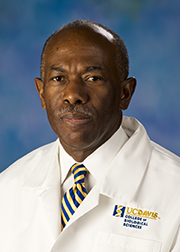
FAYETTEVILLE, Ark. – The University of Arkansas will award honorary degrees to two men who are nationally recognized as leaders in their respective fields.
Frank Broyles coached Arkansas Razorback football for 19 seasons and served as Razorback athletic director for another 31 years. He will receive an honorary Doctor of Humane Letters degree.
Dr. James Hildreth, a native of Camden, is dean of the College of Biological Sciences at the University of California, Davis, and has been a pioneer in HIV and AIDS research. He will receive an honorary Doctor of Science degree.
“It is a great privilege to be able to recognize two men who have accomplished so much and left such a lasting impact,” said Chancellor G. David Gearhart. “For five decades Coach Broyles has been the most prominent name in Arkansas sports. He built the Razorbacks into the state’s team – while taking Razorback Athletics to national prominence. He did this with great integrity, never losing sight of the student-athletes in his programs, always working for the good of the University of Arkansas and the state.
“Dr. James Hildreth is a true pioneer, both as groundbreaking scientist in HIV/AIDS research, and as a man who has broken through racial barriers his entire life. This Camden native was the first African American from Arkansas to be selected as a Rhodes Scholar; the first African American to earn a full professorship at the Johns Hopkins School of Medicine; and the first African American dean of the College of Biological Sciences at the University of California, Davis. Since the mid-1980s he has been in the front line of medical researchers looking for treatments and cures for HIV/AIDS. As a leading scientist and educator Dr. Hildreth represents the outstanding intellectual talent our state has produced and contributed to the world.”
Both honorary degrees will be presented during the All-University Commencement ceremony that begins at 8:30 a.m. Saturday, May 9, in Bud Walton Arena. Both Broyles and Hildreth will speak to the graduates during the ceremony.
Coach Frank Broyles
 |
|
Coach Frank Broyles |
Frank Broyles has been a tireless goodwill ambassador for the University of Arkansas and the entire state for more than five decades. In his 19-year stint as Arkansas’ head football coach (1958-76), the Razorbacks posted a record of 144-58-5, captured a national title in 1964, seven Southwest Conference championships and earned 10 bowl berths.
Broyles was named U of A director of athletics in 1973, a title he balanced with his head coaching duties until 1976 when he retired as Razorback head coach. He made a move to the broadcasting booth a short time later, working along-side legendary sports announcer Keith Jackson for nine years as part of the ABC network’s college football coverage.
As the director of athletics, Broyles laid the groundwork for transforming Razorback Athletics into an all-sport program that produced 43 national championships, 57 Southwest Conference and 48 Southeast Conference championships, 22 bowl appearances and a bevy of other team and individual accomplishments.
Coach Broyles also worked tirelessly to create athletic facilities on the U of A campus that would give his coaches the best possible advantage to produce winning teams. From Bud Walton Arena to the more than 70,000-seat Donald W. Reynolds Razorback Stadium, Broyles constructed athletic competition facilities to rival any university in America.
Broyles is a member of over a dozen Halls of Fame, and was one of the first inductees in the U of A Sports Hall of Honor. He was inducted into the College Football Hall of Fame in 1983 and honored by the National Football Foundation in 2000 for outstanding achievement as an athletic director.
Another tribute was the establishment of the Broyles Award in 1996, in recognition of his long- standing success with his assistant coaching staffs. The award is given annually to the country’s top assistant coach.
In 1982, Coach Broyles chaired the “Campaign for Books” for the University of Arkansas, a drive that added more than 100,000 volumes to the University Libraries. He served as co-chair of the Campaign for the Twenty-First Century that raised $1.046 billion for the university. He has also been a generous personal benefactor to the university’s academic programs.
Broyles retired from the University on Dec. 31, 2007 and went to work for the Razorback Foundation. In July 2014, Broyles retired from the Razorback Foundation and now works full time with The Frank and Barbara Broyles Foundation, an organization dedicated to touching the lives of those suffering from Alzheimer’s disease and their caregivers. More than 600,000 copies of his Coach Broyles Playbook for Alzheimer’s Caregivers have been distributed free of charge to caregivers worldwide.
Coach Broyles resides in Northwest Arkansas with his wife, the former Gen Whitehead, and has six children, 14 grandchildren and four great-grandchildren.
Dr. James Hildreth
 |
| Dr. James Hildreth |
Dr. James Hildreth was born in Camden and graduated as class valedictorian from Camden High School. He attended Harvard University and became the first African American Rhodes Scholar from Arkansas. He graduated from Harvard with a degree in chemistry and earned a doctorate in immunology at Oxford University in England.
Hildreth then attended Johns Hopkins University School of Medicine, graduating with a medical degree in 1987 and joining the faculty as an assistant professor.
Hildreth’s academic career is marked by several significant milestones: in 2002, he became the first African American to earn full professorship with tenure at Johns Hopkins School of Medicine. In 2011, he was named dean of the College of Biological Sciences at the University of California, Davis, becoming the first African American dean at that institution.
Hildreth began his groundbreaking research on the human immunodeficiency virus in 1986, while still working on his medical degree at Johns Hopkins. His research has been funded through grants from the National Institutes of Health for more than two decades. He is internationally recognized for his work, has published more than 100 scientific articles and is the inventor on 11 patents based on his research.
In 2001, Hildreth was the chief of the Division of Research for the NIH’s National Center on Minority Health and Health Disparities when he and his team of researchers developed a contraceptive cream that destroys the AIDS virus and holds the promise of stopping the transmission of the disease. The product was specifically designed to support women around the world who have very limited means of protecting themselves from HIV.
In July 2005, Hildreth became director of the NIH-funded Center for AIDS Health Disparities Research at Meharry Medical College.
He has also been a leader in the effort to engage churches and faith leaders in the fight against AIDS and received a major grant from the Centers for Disease Control to support this partnership.
Hildreth has received numerous awards over his career for mentoring, leadership and his efforts related to diversity. These include the NIH Director’s Pioneer Award and the Frederick C. Greenwood Award for service that directly affects disadvantaged and underserved ethnic populations.
He has been inducted into the Arkansas Black Hall of Fame and the Johns Hopkins University Society of Scholars. He currently serves on the Harvard University Board of Overseers.
Hildreth is a member of the Institute of Medicine, part of the National Academy of Sciences, the Alpha Omega Alpha Honorary Medical Society as well as numerous professional associations and societies related to the fields of microbiology, immunology and cell biology.
About the University of Arkansas: The University of Arkansas provides an internationally competitive education for undergraduate and graduate students in more than 200 academic programs. The university contributes new knowledge, economic development, basic and applied research, and creative activity while also providing service to academic and professional disciplines. The Carnegie Foundation classifies the University of Arkansas among only 2 percent of universities in America that have the highest level of research activity. U.S. News & World Report ranks the University of Arkansas among its top American public research universities. Founded in 1871, the University of Arkansas comprises 10 colleges and schools and maintains a low student-to-faculty ratio that promotes personal attention and close mentoring.
Topics
Contacts
Steve Voorhies, manager, media relations
University Relations
479-575-3583, voorhies@uark.edu